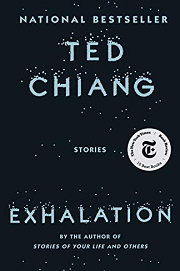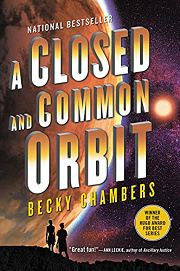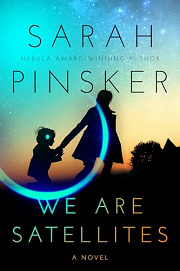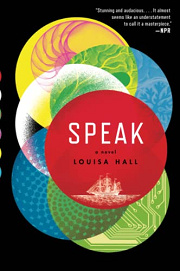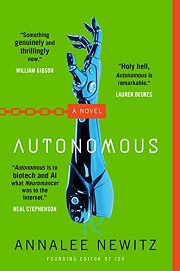Share your thoughts in a quick Shelf Talk!
The Lifecycle of Software Objects by Ted Chiang
What if raising an artificial intelligence felt less like coding and more like parenting? Spanning years of devotion and difficult choices, The Lifecycle of Software Objects explores love, responsibility, and the growing pains of digital life as caretakers guide their creations toward uncertain futures.
Have you read this book? Share what you liked (or didn’t), and we’ll use your answers to recommend your next favorite read!
Love The Lifecycle of Software Objects but not sure what to read next?
These picks are popular with readers who enjoyed this book. Complete a quick Shelf Talk to get recommendations made just for you! Warning: possible spoilers for The Lifecycle of Software Objects below.
In The Lifecycle of Software Objects, did you enjoy ...
... the tender, caregiver‑ward bond as an AI learns personhood?
A Closed And Common Orbit by Becky Chambers
If you were moved by Ana patiently raising the digients over years—coaching them through language, boundaries, and autonomy while Derek wrestles with platform shifts and custody-like questions—you'll love how A Closed and Common Orbit follows an AI adjusting to a new body and identity under the care of a fiercely loyal human friend. It has that same intimate, day‑to‑day texture of mentorship, quiet ethical dilemmas, and the hard work of helping a nascent mind become itself.
... meditative, morally knotty questions about artificial beings’ inner lives and love?
Klara And The Sun by Kazuo Ishiguro
You appreciated how The Lifecycle of Software Objects asks whether affection, loyalty, and consent can truly apply to created minds—think of the debates over the digients’ sexuality and ownership after Blue Gamma’s collapse. Klara and the Sun offers a similarly restrained, aching exploration as an Artificial Friend observes a family’s expectations and bargains of love, inviting you to weigh what obligations humans owe to thinking creations—and what those creations feel in return.
... how a new consumer technology quietly reshapes a family over years?
We Are Satellites by Sarah Pinsker
If the slow, accumulating consequences of adopting digients—training routines, upgrades, the economic precarity after Blue Gamma—hooked you, We Are Satellites tracks a family as they decide whether to implant a cognitive device that promises an edge. Like Ana and Derek’s long‑view choices, the book focuses on intimate ramifications: school, work, identity, and the subtle rifts and loyalties that form when tech becomes part of daily life.
... multi‑voiced reflections on AI, memory, and consent unfolding over time?
Speak by Louisa Hall
The way Chiang lets ethical stakes accrete—porting the digients between platforms, negotiating their legal status, and confronting questions of sexual consent—pairs beautifully with Speak. Through interwoven voices across decades, it examines the creation of lifelike companions and the human needs projected onto them, building a slow, resonant argument about responsibility to the beings we make.
... the ethics of ownership, labor, and consent for intelligent creations?
Autonomous by Annalee Newitz
If the moral gray zones in Lifecycle—from licensing constraints to whether the digients can meaningfully consent—stayed with you, Autonomous tackles related questions head‑on. It follows a patent pirate and a military agent partnered with a contract‑bound robot, exposing the tangle of IP law, personhood, and desire. You’ll recognize the same uneasy terrain where affection and duty collide with markets and control.
Unlock your personalized book recommendations! Just take a quick Shelf Talk for The Lifecycle of Software Objects by Ted Chiang. It’s only a few questions and takes less than a minute.
